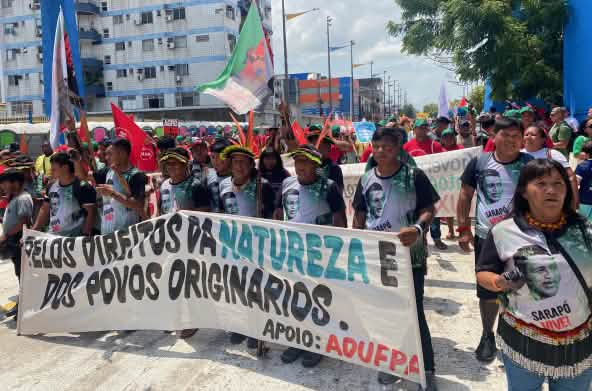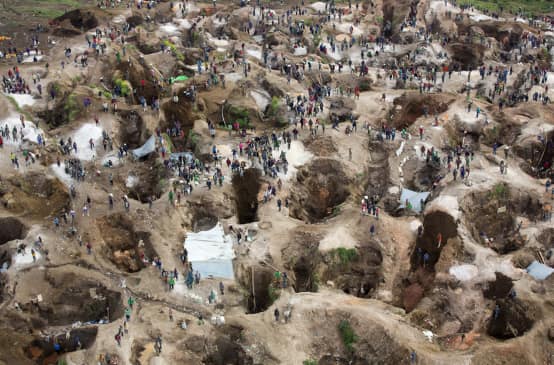Completed campaign
Ecuador’s isolated indigenous peoples need protection
The Yasuní National Park in Ecuador is not only a unique natural treasure, it is also home to isolated indigenous peoples. The forest has been put off-limits to protect them from loggers and oil prospectors, yet enforcement measures are failing. Please support the petition to Ecuador’s government.
News and updatesTo: the President of Ecuador, Mr. Rafael Correa; Minister of Justice, Dr. F. Johana Pesantez Benitez; Attorney General, Mr. Galo Chiriboga; Minister of Non-renewable Natural Resources, Mr. Pedro Merizalde Pavón
“.”The scenes in Ecuador’s Amazon rainforest are reminiscent of centuries past: Isolated indigenous tribes armed with spears are defending their ancestral land against invading loggers, oil prospectors and missionaries.
Yet this conflict is happening now. The Tagaeri and Taromenane tribes want to continue to live independently in the isolation of the rainforest, as any contact with the outside world would destroy their ancient culture.
To secure the rights of the indigenous peoples, the Ecuadorian government declared the southern part of the Yasuní National Park to be an “untouchable zone” in 1999, putting it off-limits to all outsiders.
However, it is not clear whether the reservation – an area of 758,051 hectares allocated at the drawing board in the capital Quito – is enough to ensure the survival of the nomadic forest dwellers. We certainly cannot contact them for their opinion.
What’s worse: The laws – and the tribal spears raised in warning – are increasingly being ignored. Loggers and prospectors in search of gold and oil have provoked raids targeting the Tagaeri and Taromenane to gain unhindered access to the resources of the rainforest.
The last two known killings took place in oil concession number 16 of Repsol, a Spanish oil company. Largely a passive onlooker, the Ecuadorian government has aggravated the problem by massively expanding oil drilling in the rainforest. The South American country has offered multinational oil companies 21 drilling concessions on a total of three million hectares of rainforest land occupied by indigenous peoples.
Human rights activists and anthropologists have turned to the Ecuadorian government with a 16-point plan to end the spiraling violence. Please support their petition.
To: the President of Ecuador, Mr. Rafael Correa; Minister of Justice, Dr. F. Johana Pesantez Benitez; Attorney General, Mr. Galo Chiriboga; Minister of Non-renewable Natural Resources, Mr. Pedro Merizalde Pavón
Ladies and Gentlemen,
I hereby support the petition to the Ecuadorian government containing the 16 recommendations below by Ecuadorian anthropologists to protect isolated indigenous peoples.
Sincerely,
Below is a summary of the 16 recommendations. The original document in Spanish is located here:
https://www.salvalaselva.org/mailalert/918/selva-para-los-pueblos-aislados-del-ecuador
1. We call on the Attorney General to launch a thorough investigation of the killings in the years 2003, 2004, 2006, 2007, 2008, 2009 and 2013. The most recent events must be investigated and clarified as a first step. Statements from witnesses, evidence and other data must be collected in this context (diachronic anthropological study).
2. The verdict and reparation measures must take into account the pluralistic legal standards enshrined in the constitution (Article 171), and in particular the recent killings in oil concession No. 16. We recommend that the Attorney General commission an expert study to shed light on internal and external sociocultural backgrounds and motivations. Furthermore, the responsibility of the Ministry of Justice (PMC) must be established with regard to conflict prevention.
3. Legal standards and institutions must be developed further in order to guarantee and implement the rights of isolated peoples in the constitution of 2008.
4. The precautionary measures and plans of the government introduced between 2008 and 2013 and their effectiveness for protecting the lives and rights of isolated peoples (Tagaeri, Taromenane and other groups) must be reviewed.
5. The application of the protection guidelines for isolated peoples of the United Nations High Commissioner for Human Rights must be verified.
6. A policy for the isolated peoples in Ecuador must be established. Binational and regional measures to protect the isolated peoples of the Amazon Basin and Chaco must be coordinated with Peru and neighboring governments.
7. The land rights and land claims necessary for the survival of indigenous tribes must be guaranteed and previously approved areas expanded.
8. Preparedness measures must be coordinated between the various ministries (Non-Renewable Resources, Justice, Health and others) to ensure monitoring and conflict prevention.
9. Oil drilling and road construction in the Yasuní region must be reconsidered given the high vulnerability of the isolated peoples and the Waorani tribe.
10. Logging, settlement, tourism, and other legal and illegal activities in the indigenous areas must be effectively controlled.
11. The operation of oil wells in the indigenous areas must be monitored, limited or terminated, especially in areas where the presence of isolated peoples has been documented, such as the Armadillo and Nenke Apaika (Block 31), Yampuna (Block 14) and Iro (Block 16) oil concessions, in order to protect the lives, migration and traditional land use of the indigenous peoples.
12. A moratorium on new concessions must be declared for the Yasuní region.
13. Flights by helicopters or other aircraft and the dropping of food or equipment over the territories of the isolated peoples must be stopped.
14. The Ecuadorian government must convene a roundtable of all stakeholders. These include indigenous organizations such as CONAIE, CONFENIAE, Nawe AMWAE and ONWO, human rights groups, religious missions, environmental organizations, representatives of the academic community and government institutions such as the Ministry of Non-Renewable Resources, Ministry of Environment, SENPLADES, Secretariat of Peoples and Social Movements, Ministry of Justice, Attorney General, Ministry of Health, and ombudsmen.
15. Any attempt by the government or religious or private individuals or organizations to contact isolated groups of Tagaeri and Taromenane must be prevented. The peoples’ right to self-determination must be respected.
16. Finally, we would like to note that the Ecuadorian government is primarily responsible for protecting the lives of the isolated peoples. It must guarantee their existence, future and self-determination. Any failure to do so can be classified as ethnocide.

